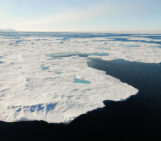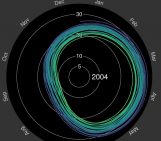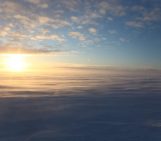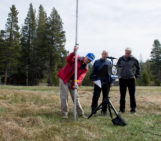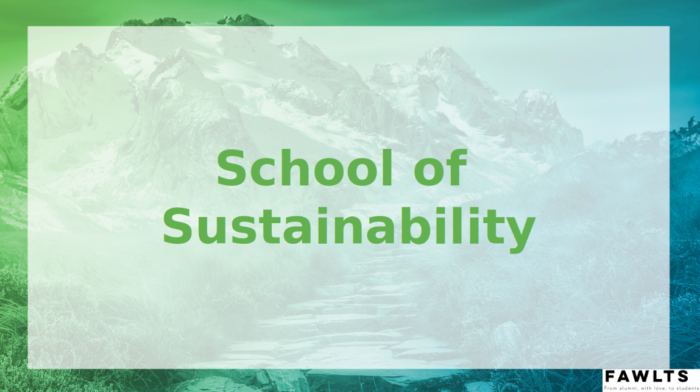
Next generations will not only see impacts of climate change first-hand, but they will also deal with the associated societal implications. Implementing climate solutions and orienting themselves in a growing, green job market need cutting-edge knowledge, which is often hard to get through the ordinary, high-school syllabus. As early-career cryo-scientists (Federica is a PhD student in glacial geomorphology, while Francesco is a mountain hydrologist), we study some of the most important sentinels of climate change: mountains. Thus, we thought we could contribute with our experience in the development of more aware young citizens. That’s what School of Sustainability stands for!
What is School of Sustainability?
School of Sustainability (SoS, https://www.fawlts.com/school-of-e-s-t) is a volunteer-based training program for Italian high-school students, particularly aimed at those close to their diploma and so to key career choices. The key intuition behind SoS is not only to introduce students to the topic of climate change & sustainability, but also to advise them on the associated, rapidly growing job market, something that is usually neglected despite its growing importance. The goal is to prepare them for real-world challenges, by providing the highly needed toolbox of science & technology along with an atlas of potential career paths that they often don’t even imagine. SoS does so by intentionally focusing on solutions to the climate crisis, and on how each of us can contribute to such solutions. That’s why we like the word Sustainability!
The program is led by alumni for students, meaning that — for example — we organized SoS in the high school that we both attended near Milan, in Italy. The purpose of SOS is to enable connections between students and young mentors, who can help them find their own way in this uncertain future. This is useful to complement experiences that are already in place at school level. Alumni also enjoy this initiative, because they can reconnect with their high school, share some of the experiences they have gained since the diploma, and ultimately create a virtuous, circular knowledge market that can build the body of knowledge needed to tackle current climate-change challenges.
SoS is part of FAWLTS (From Alumni, With Love, To Students), a nonprofit association born and developing throughout Italy (for now!). FAWLTS expands on the core activities of SoS on other levels, including one-to-one mentorship, a sister School of Start Up, and career days where alumni from a broad spectrum of backgrounds discuss about their experience with interested students. FAWLTS was established in 2019 and is based on high-school hubs; each of these hubs is led by alumni coming from that high school. This is essential to maintain an approach that is well-rooted in each specific territory, which is fundamental to make this kind of experience successful for both students and alumni.
But what is it ABOUT?
The fact that FAWLTS is so young (only 2-year-old!) implied that we had to fully invent SoS, which was both exciting and daunting given our life as early career scientists and the lack of past experience on this matter.
We started defining the core idea behind the School: focusing on solutions to increase students’ awareness and restore hope in a sustainable future. We then gathered a couple of other alumni and friends that could complement our background as Cryospheric Scientists, one working in a strategic consultancy firm with a focus on sustainability, and another one working in a start-up developing technology platforms to measure, quantify, and reduce carbon footprints. With them on board, we covered all the aspects, from the scientific bases to the economic and social implications. We also had the link we needed to the job market to make SoS successful!
We then came up with the structure of the School, divided in three workshops. The first chapter deals with the basic scientific knowledge of climate change, including greenhouse gas emissions and the like. We felt we needed to go beyond that though, and so we included a second part on impacts to broaden the students’ perspective on the implications of climate change. The second part focuses on the decisions that have been made at political and societal levels to tackle the climate-change issue. We thought it was important to provide students with the lexicon of their future, and so we present them with things like the Paris Agreement or the Sustainable Development Goals. Furthermore, we explain what companies and agencies are doing and what to expect from the job market in the next few years. Finally, the last workshop focuses on each person’s responsibility, so students calculate their own footprint and identify specific ways they could follow to achieve a sustainable future.
We organized the school between December 2020 and January 2021, a period characterized by yet another COVID-19 wave across Europe. This situation obviously forced us to organize SoS remotely. The attendance has been so large (250+ students) that the online platform nearly collapsed several times. Besides these technological challenges, and the difficulty of engaging students from behind a laptop screen, this massive response confirmed that we were on the right track! We thus have decided to propose the initiative again this year, so that students that were not able to participate will be able to join SoS.

Example of word cloud produced by students during SoS when asked about their “first thought” on climate change. The larger the word, the more frequent this word was mentioned by students in their answers. Expectedly, large words (in Italian) include “global warming”, “glacier melt”, and “pollution”. Perhaps less expected were answers like “solutions” or “problem to be solved”, which shows how new generations have crystal clear in their minds the societal implications of climate change. [Credit: FAWLTS]
Cryo-what?
Creating a training program for young students from scratch may sound “out of scope” for early career researchers, and particularly for cryospheric scientists like us who are used to climb mountains and dig into snow rather than engaging with teenagers. And yet, we did learn a number of lessons along the way that we thought we could share.
First, this is no easy task. We did have a hard time figuring out how to communicate advanced topics like IPCC scenarios, glacier shrinkage, droughts etc. We are used to share our results with scientists but doing the same with high-school students is completely different; at the same time, we also needed to bridge the gap between science and the real-world job market! We feel like more training and more background should be provided for PhD students and early-career scientists to engage with the public and communicate effectively.
Second, focusing not only on the problem, but also on real-world solutions is a great way of making climate change a proximal concept for new generations. They get to realize what is at stake, how things may play out in practice, and how we could mitigate and/or adapt. Knowing that climate change is real is not enough! We need to contextualize it with respect to everyday life and provide concrete ways out of the crisis. In a nutshell: solutions mean opportunities to play an active role in shaping the future, even in a warming climate.
Third, the job market related to sustainability is evolving so rapidly that mapping and conveying all opportunities is almost impossible. Despite this limitation, we ended this first edition of SoS with the idea that sustainability rhymes with employability, a strategic point to keep in mind when thinking about education of young adults and their career opportunities.
Last but not the least, we found it natural to leverage our expertise as cryospheric scientists to explain real-world implications of climate change via glaciers, snow, etc. In doing so, we found that the cryosphere has a fascinating aspect that immediately engages the public. This gives an unprecedented opportunity for cryo-folks to play a unique role in dissemination and communication! We are taking this opportunity again this year, when we will repeat SoS. What about you?
If you are interested in FAWLTS and School of Sustainability, do not hesitate to contact us, we are always looking for new people to join our team! We would also like to expand across borders and hopefully make School of Sustainability international!
Editeb by Giovanni Baccolo
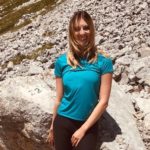 Federica Minotti is a PhD student at Università di Bologna, Italy. Her research focuses on the interaction between glaciers and sediment transfer. She is part of the SedInOut Italy-Austria Interreg Project, focusing on the development of a risk management methodology through the assessment of sediment availability for mass movements in mountain environments. She tweets as @MinottiFederica. To contact her, please write to federica.minotti2@unibo.it
Federica Minotti is a PhD student at Università di Bologna, Italy. Her research focuses on the interaction between glaciers and sediment transfer. She is part of the SedInOut Italy-Austria Interreg Project, focusing on the development of a risk management methodology through the assessment of sediment availability for mass movements in mountain environments. She tweets as @MinottiFederica. To contact her, please write to federica.minotti2@unibo.it
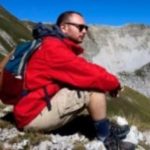 Francesco Avanzi is a researcher at CIMA Research Foundation, where he works on the cryosphere-research portfolio. His activities include mountain hydrology and the cryosphere, with a particular interest in developing operational water-forecasting models for cryosphere-dominated regions. He tweets as @WorldOfChecco. Email contact: francesco.avanzi@cimafoundation.org
Francesco Avanzi is a researcher at CIMA Research Foundation, where he works on the cryosphere-research portfolio. His activities include mountain hydrology and the cryosphere, with a particular interest in developing operational water-forecasting models for cryosphere-dominated regions. He tweets as @WorldOfChecco. Email contact: francesco.avanzi@cimafoundation.org

